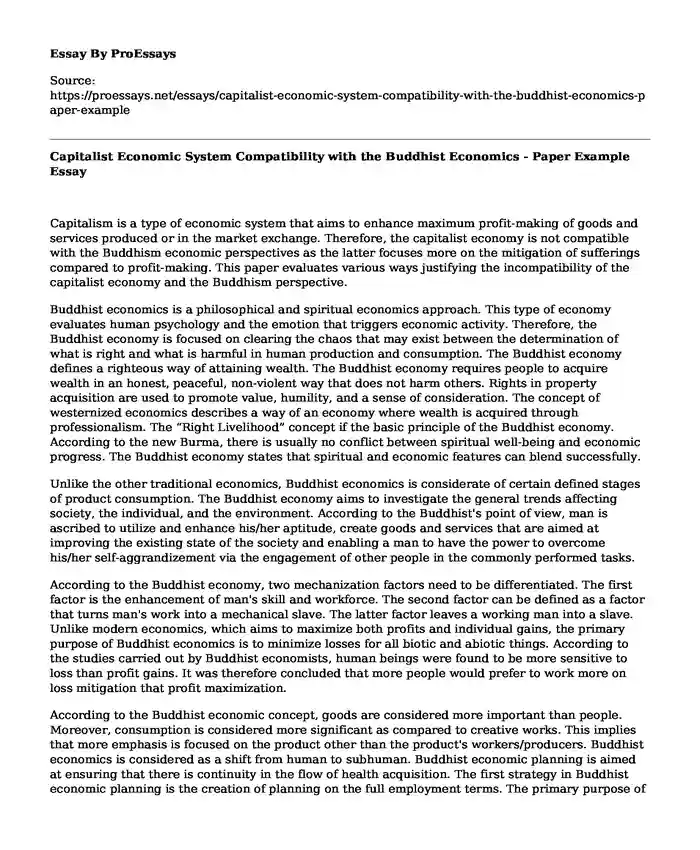Capitalism is a type of economic system that aims to enhance maximum profit-making of goods and services produced or in the market exchange. Therefore, the capitalist economy is not compatible with the Buddhism economic perspectives as the latter focuses more on the mitigation of sufferings compared to profit-making. This paper evaluates various ways justifying the incompatibility of the capitalist economy and the Buddhism perspective.
Buddhist economics is a philosophical and spiritual economics approach. This type of economy evaluates human psychology and the emotion that triggers economic activity. Therefore, the Buddhist economy is focused on clearing the chaos that may exist between the determination of what is right and what is harmful in human production and consumption. The Buddhist economy defines a righteous way of attaining wealth. The Buddhist economy requires people to acquire wealth in an honest, peaceful, non-violent way that does not harm others. Rights in property acquisition are used to promote value, humility, and a sense of consideration. The concept of westernized economics describes a way of an economy where wealth is acquired through professionalism. The “Right Livelihood” concept if the basic principle of the Buddhist economy. According to the new Burma, there is usually no conflict between spiritual well-being and economic progress. The Buddhist economy states that spiritual and economic features can blend successfully.
Unlike the other traditional economics, Buddhist economics is considerate of certain defined stages of product consumption. The Buddhist economy aims to investigate the general trends affecting society, the individual, and the environment. According to the Buddhist's point of view, man is ascribed to utilize and enhance his/her aptitude, create goods and services that are aimed at improving the existing state of the society and enabling a man to have the power to overcome his/her self-aggrandizement via the engagement of other people in the commonly performed tasks.
According to the Buddhist economy, two mechanization factors need to be differentiated. The first factor is the enhancement of man's skill and workforce. The second factor can be defined as a factor that turns man's work into a mechanical slave. The latter factor leaves a working man into a slave. Unlike modern economics, which aims to maximize both profits and individual gains, the primary purpose of Buddhist economics is to minimize losses for all biotic and abiotic things. According to the studies carried out by Buddhist economists, human beings were found to be more sensitive to loss than profit gains. It was therefore concluded that more people would prefer to work more on loss mitigation that profit maximization.
According to the Buddhist economic concept, goods are considered more important than people. Moreover, consumption is considered more significant as compared to creative works. This implies that more emphasis is focused on the product other than the product's workers/producers. Buddhist economics is considered as a shift from human to subhuman. Buddhist economic planning is aimed at ensuring that there is continuity in the flow of health acquisition. The first strategy in Buddhist economic planning is the creation of planning on the full employment terms. The primary purpose of the full employment aspect is to ensure a defined path to enhance wealth creation.
The Buddhist economy, unlike the materialistic theory, is more concerned with liberation. Buddhist economy states that wealth does not prohibit liberation; however, the attachment to wealth does. Therefore, the key concepts in the Buddhist economy are violence and simplicity. The Buddhist economic concept is usually guided by the belief that small means can lead to amazingly satisfactory outcomes—the Buddhist economy aims to maximize the well-being of human beings while minimizing the consumption rate. For example, if a cloth is bought to create a specified amount of temperature, the essential task would be to acquire the cloth with the smallest effort possible.
Cite this page
Capitalist Economic System Compatibility with the Buddhist Economics - Paper Example. (2023, Dec 17). Retrieved from https://proessays.net/essays/capitalist-economic-system-compatibility-with-the-buddhist-economics-paper-example
If you are the original author of this essay and no longer wish to have it published on the ProEssays website, please click below to request its removal:
- History of Christianity in Hui Research
- Research Paper on Globalization and Populism
- Assignment Example on Rafael Trujillo
- Essay Sample on the War Between the Evil and the Divine Within: Exploring Truth, Sight, and Vision
- Essay Example on Raised Christian: My Mother's Role in Shaping My Faith
- Essay Example on Global Management Practicum: A Tool for Success
- Existence of God - Essay Example







